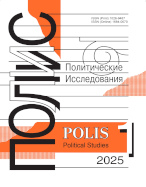Social Inequality as a Problem Inherent in the Formation of Post-Economic Society
Inozemtzev V.L.,
Dr. Sci. (Econ.), Director of Center for Postindustrial Studies, Head of the Department of World Economy, Faculty of Public Governance, M.V. Lomonosov Moscow State University, slava_in@yahoo.com
Rubric: PROBLEMS AND JUDGMENTS
For citation:
Inozemtzev V.L. Social Inequality as a Problem Inherent in the Formation of Post-Economic Society . – Polis. Political Studies. 1999. No. 5
Abstract
"Using extensive material of U.S. realities, the author of the article, Director, Moscow Centre for the Study of Post-Industrial Society, considers the processes of the formation of two new social groups in post-industrial society (to figure in place of the working class and bourgeoisie): the upper one, professing post-material values and occupied in spheres of high technology
Content No. 5, 1999
See also:
Sorokin K.E.,
Russia and the Play of Geopolitical Interests in the Great Ocean Area. – Polis. Political Studies. 1994. No4
Kapustin B.G.,
Postcommunism as Postmodernity (Russian Variant). – Polis. Political Studies. 2001. No5
Pastukhov V.B.,
From Statehood to the State: Europe and Russia. – Polis. Political Studies. 1994. No2
Laslo E. ,
Birth of a World - Birth of a Science - Birth of an Age. – Polis. Political Studies. 1993. No2
Derluguian G.,
The Process and Prospects of Soviet Collapse: Bancruptcy, Segmentation, Involution. – Polis. Political Studies. 2000. No3





.jpg)






 print
print.jpg)
.jpg)
